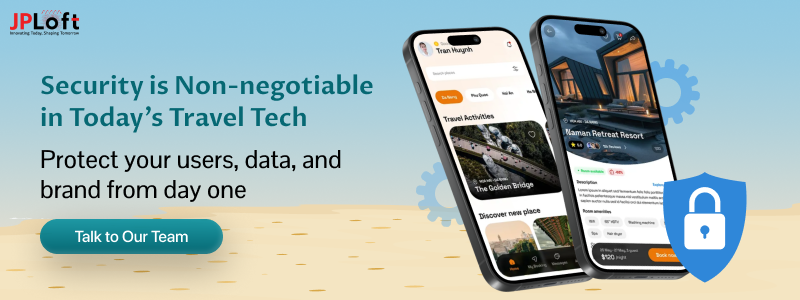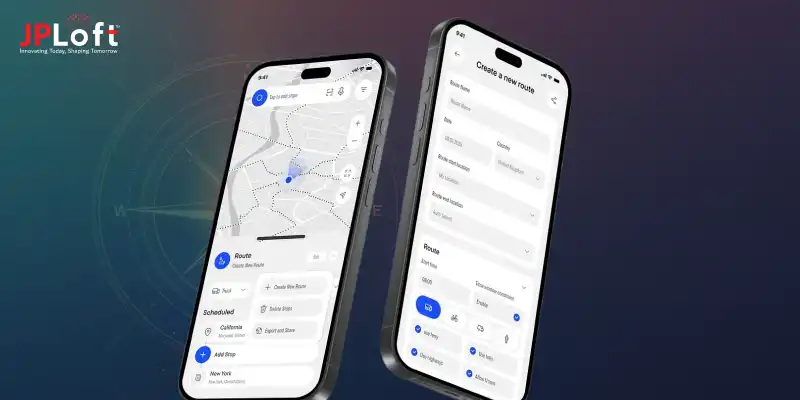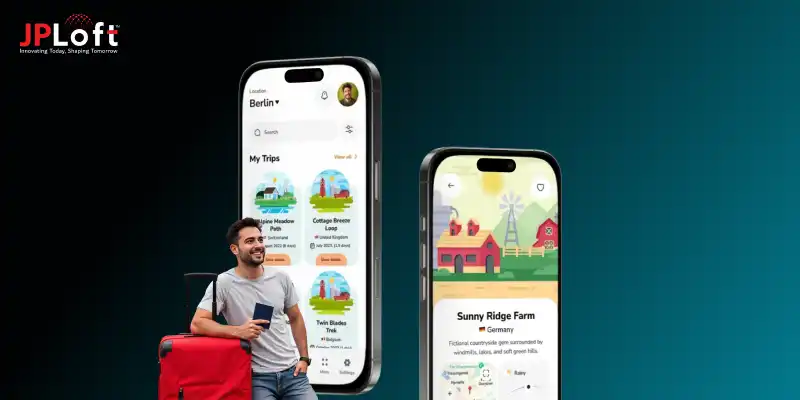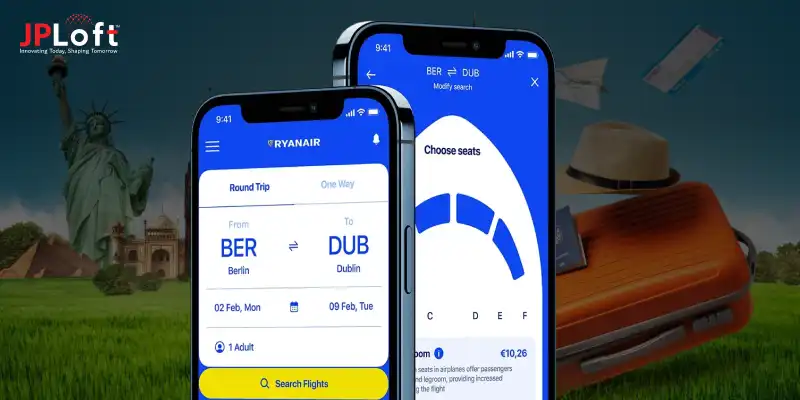As Bruce Schneier once said, “Security is not a product, but a process.”
This is a must-to-follow process in this tech-savvy world. Here’s why travel app security matters in 2025.
Travel apps are pocket-sized travel agents that book flights, manage hotel stays, plan itineraries, and even handle payments.
However, as they become more powerful, they become prime targets for cyber attacks. With digital travel at an all-time high in 2025, securing your travel app is not only smart, but also absolutely necessary.
A single breach can expose personal information, undermine user trust, and seriously harm your brand. This guide covers everything you need to know about securing a travel app, including common vulnerabilities, AI-driven protection, real-world breaches, compliance mandates, and more. Whether you're a startup or an enterprise, the journey to creating a secure, successful app begins here.
Key Takeaways
Travel apps in 2025 must prioritize security as they handle sensitive data, payments, and location tracking, making them prime cyberattack targets.
Major threats include data breaches, weak APIs, and AI-related risks that can erode trust, disrupt services, and damage app reputation.
Strong security architecture, encryption, authentication, and PCI-DSS compliance must be built into the app from day one.
AI enhances travel app security through real-time threat detection, behavioral analysis, and smarter access control systems.
Global compliance with GDPR, CCPA, and platform privacy policies is essential to protect user data and ensure legal safety.
Travel Apps in 2025: Growth, Purpose, and Security Implications
A travel app helps users manage every step of their journey from booking flights and accommodations to navigating local services, accessing itinerary reminders, and even joining AR-guided tours. These apps combine personalization, real-time assistance, and digital convenience, making them indispensable for today’s travelers.
With the growing demand for seamless, mobile-first travel experiences, these apps are no longer a luxury; they’re an expectation. From solo backpackers to business travelers, people rely on travel apps for everything from digital check-ins to emergency alerts and curated destination content.
1. 2025 & Beyond: Market Stats You Can’t Ignore
Apps like Hopper, Agoda, and Omio have become staples in modern travel due to their predictive pricing, real-time booking, and user-friendly design.
-
- According to Grand View Research, the online travel agency (OTA) market was valued at $612.95 billion in 2024. It is projected to grow at a compound annual growth rate (CAGR) of 8.6%, reaching approximately $1,003.13 billion by 2030.
- Market.us reports the smart travel apps segment, those which integrate AI, IoT, and big data—is expected to grow from $2.15 billion in 2024 to $11.6 billion by 2034, at an 18.4% CAGR.
- In addition, Market.us reports that the broader travel and tourism apps market stood at $650.7 billion in 2024. It is projected to surge to $3,552.7 billion by 2034, driven by a robust 18.5% CAGR over the forecast period.
These stats highlight the explosive rise in digital travel tools. For travel businesses exploring innovative booking and trip-planning models, it’s essential to understand how to create an app like Hopper that blends predictive intelligence with strong mobile UX.
2. Security Implications
This level of growth invites not only business opportunities but also security challenges. With financial transactions, location tracking, and user data at the heart of travel apps, the need for travel mobile app security has never been more urgent. Simply put, security of your travel app is essential for both user trust and long-term success.
Why Must You Secure Your Travel App in 2025?
It is more important than ever to protect sensitive user data because travel apps continue to rule the global tourism and hospitality sector.
In 2025, these applications manage payments, GPS information, ID verifications, and user preferences. Simply going far beyond assisting with hotel or flight reservations.
Therefore, they are prime targets for cyberattacks, and if they are not adequately protected, a single breach could result in significant financial and reputational harm.
Here’s why you must secure your travel app in this tech-savvy world:
► Travel Apps Handle Sensitive Personal Data
Travel apps handle sensitive user data such as credit card numbers, passports, hotel check-ins, and location sharing. Failure to protect this data can result in identity theft and financial fraud.
► A Breach Can Cost You Millions
According to IBM, the average cost of a data breach in 2024 is more than $4.45 million, and this figure is expected to rise. Consider the loss if your app is used by thousands of people around the world; it's more than just money; it's user trust.
► Poor Security Damages Brand Reputation
Today, security failures don’t take much time to make headlines. Just one breach and your loyal customers can uninstall your app, leave poor reviews, or even worse, switch to your competitors.
► App Stores Penalize Insecure Apps
Platforms like Google Play and the App Store require apps to meet strict privacy and security guidelines. Failing to comply may result in your app being delisted or flagged.
► Increased Cyber Threats in Travel Industry
The travel industry is more vulnerable to phishing, DDoS attacks, session hijacking, and API exploitation than ever before. This is why understanding travel app development challenges requires anticipating security concerns.
► AI and Tech Adoption Raise Risk
The more features your app offers, such as AI-based recommendations, chatbots, and smart bookings, the more chances of an attack on your travel application. Even as tech evolves, so do threats. So, while embracing AI in hospitality, make security part of your innovation process.
► In-App Payments Require PCI Compliance
Apps that process payments must comply with PCI-DSS standards. Non-compliance can result in fines, penalties, or legal issues. So, learning how to secure a travel app in 2025 is vital from day one.
In 2025, securing a travel app isn’t just about building firewalls or encrypting data; it’s about protecting people, preserving trust, and enabling growth. Therefore, securing a travel app like yours depends on it because it does.
Top Security Threats Travel Apps Face in 2025
With millions of users relying on travel apps for everything from payments to passport uploads, the security risks in 2025 have never been greater.
As more features are added to travel apps, such as AI trip planning, real-time GPS tracking, and mobile check-ins, they become more complex and, unfortunately, vulnerable.
Whether you're a developer or a business owner, understanding these threats is the first step towards creating a useful travel app security guide.
1. Data Breaches
Hackers target travel apps to steal personal information such as email addresses, passport numbers, and credit card information. A single vulnerability can potentially expose thousands of users at once.
2. Insecure APIs
Travel apps frequently incorporate third-party services such as hotel listings, payment gateways, and geolocation tools. Weak or misconfigured APIs not only pose technical risks, but they can also harm user trust, reduce retention, and even disrupt your travel app monetization strategies if not addressed.
3. Inadequate User Authentication
Weak login systems (such as simple passwords or the lack of two-factor authentication) make it easier for attackers to access user accounts. Multi-layered authentication should be considered mandatory in travel app security planning.
4. Code Tampering & Reverse Engineering
Hackers can decompile your app, insert malicious code, and republish it under a similar name, compromising both its integrity and user experience.
5. Insider Threats
Sometimes the risk comes from within. If there are no strong access control protocols in place, developers or backend staff may misuse sensitive user data.
6. Lack of End-to-End Encryption
Apps that fail to encrypt data during transmission are vulnerable to man-in-the-middle attacks, particularly when using public Wi-Fi. This is a fundamental security requirement for any app that handles payments or personal information.
7. AI-Driven Risks
As more apps attempt to create an AI app for personalisation and smart recommendations, new attack surfaces emerge. AI brings power but also complexity, which requires additional security.
8. Phishing & Social Engineering
Fake travel apps, malicious links, and scam messages can trick users into disclosing personal information. Lack of awareness and protection is one of the reasons why online travel apps fail to establish long-term user trust.
Security threats in travel apps are evolving faster than ever. Whether you're scaling an existing app or starting fresh, treating security as a core feature, not an afterthought, is what separates sustainable platforms from those that crash under pressure. A proactive travel app security strategy is your best defense.
Steps to Secure a Travel App in 2025
Securing your travel app in 2025 goes far beyond using a basic password system. With increased digital touchpoints from AI-powered personalization to AR-based navigation, every feature adds a new security layer to manage.
Whether you're launching a new platform or updating an existing one, here's your guide to travel app security with the key steps you must follow.
Step 1: Start with Secure App Architecture
Use layered architecture and apply the principle of least privilege (PoLP) to restrict internal access. Build security into the design, not as an afterthought.
Step 2: Use End-to-End Data Encryption
Protect user data during transmission and storage. Use SSL/TLS protocols and encrypt sensitive fields like payment info and personal IDs.
Step 3: Implement Strong Authentication & 2FA
Use multi-factor authentication (MFA) for user logins and backend admin access. Biometrics and OTPs boost trust and stop account-level attacks.
Step 4: Conduct Regular Security Testing
Use penetration testing, vulnerability scanning, and real-time threat detection. Testing should be automated and routine, especially before any major update.
While many businesses budget for design and features, they often overlook the cost to develop a travel app with strong security testing built in, which is essential for preventing post-launch vulnerabilities.
Step 5: Secure APIs & Third-Party Integrations
Misconfigured APIs are a major risk area. Protect them with OAuth 2.0, API gateways, and input validation, especially when integrating flight or hotel booking systems.
Step 6: Protect Offline Data Access
Apps should safely store data even when the user is offline. Use encrypted databases and disable caching of sensitive screens.
Step 7: Follow PCI-DSS for In-App Payments
If your app accepts payments, compliance with PCI-DSS is non-negotiable. This protects cardholder data and helps you secure an online travel mobile app responsibly.
Step 8: Train Your Development Team
Security is a team sport. Make sure your developers stay updated on the latest OWASP vulnerabilities and travel app development trends that affect your codebase.
Knowing how to secure a travel app in 2025 means combining smart technology with even smarter habits. It’s not just about avoiding threats; it’s about building trust, compliance, and long-term user loyalty. Use this checklist as your foundation and evolve it as your app scales.
Using AI to Boost Security of Travel Apps in 2025
AI is no longer just a feature for personalization in travel apps; it’s a frontline defense mechanism.
With threats evolving faster than ever, artificial intelligence brings the speed, scale, and predictive ability needed to stay ahead.
Whether you’re working with a small team or scaling enterprise-grade platforms, using AI can significantly strengthen your travel app security strategy.
Here’s how AI is helping secure travel apps in 2025:
1] Real-Time Threat Detection
AI algorithms can monitor app behavior 24/7 and detect unusual patterns instantly, flagging anomalies like credential stuffing or suspicious login locations before damage is done.
2] Predictive Risk Analysis
Machine learning models can assess user behavior, device trustworthiness, and login habits to assign risk scores. This helps apps dynamically decide when to trigger extra verification steps.
3] AI-Powered Fraud Prevention
From fake bookings to payment fraud, AI helps detect transactional irregularities at scale. It's especially vital for apps managing high-volume seasonal traffic.
4] Automated Security Testing
AI tools can run automated scans for known vulnerabilities and simulate hacker behavior, making it easier to plug security holes during development and updates.
5] Smarter Access Control Systems
By analyzing contextual signals (device, time, and IP address), AI improves authentication flow without annoying users, reducing friction while enhancing travel app security in 2025.
To fully unlock the potential of AI for security, partnering with an experienced AI app development company is crucial. It ensures that the AI you implement isn’t just smart but secure, scalable, and aligned with your app’s unique architecture.
If you're looking to build at enterprise scale, working with the best mobile app development company can make all the difference in creating long-term protection."
Travel App Security Compliance: What You Must Follow?
Security doesn’t just stop at strong code or encryption; it must meet the legal standards that protect user data worldwide.
With more travelers using apps to store their personal and payment details, compliance becomes non-negotiable.
Whether you’re planning your first launch or auditing an existing platform, this section serves as a guide to securing a travel app from a legal and regulatory standpoint.
A] GDPR (General Data Protection Regulation)
If your travel app serves users in the EU or EEA, GDPR compliance is mandatory. It ensures transparent data collection, explicit user consent, and strict user data protection protocols.
B] CCPA (California Consumer Privacy Act)
For apps operating in California or collecting data from U.S. users, CCPA provides rights to consumers regarding their personal information, including opt-outs, data deletion, and breach notifications.
C] PCI-DSS (Payment Card Industry Data Security Standard)
If your app processes payments, PCI-DSS compliance is a must. It governs how card data is handled, stored, and transmitted. You can simply secure an online travel mobile app just by adhering to PCI-DSS guidelines to avoid fines and breaches.
D] App Store Privacy Guidelines
Both Apple and Google Play require apps to disclose their data handling practices transparently. Make sure your app follows their evolving policies to stay live and avoid suspensions.
E] Data Minimization & Retention Policies
Regulators are pushing for less data collection and faster deletion. A leaner approach also helps when figuring out how to create a travel app that’s not just fast but secure and privacy-first from day one.
In 2025, compliance is more than a checkbox; it’s foundational to trust, retention, and credibility. From GDPR to PCI-DSS, building your app around these standards is key to long-term success in travel mobile app security.
Real-World Examples That Prove Travel App Security Matters
We often talk about security in theory, but when real travel apps experience breaches, the consequences are massive.
From leaked passports to hijacked bookings, one small vulnerability can damage millions of user records and your brand’s credibility.
If you're building a travel app today, learning from these cases is crucial to understanding why travel app security isn't optional; it's the foundation.
This section of security of a travel app explores a few real-world incidents and what they teach us.
1. Booking.com Phishing Scams (2022–2023)
Cybercriminals targeted hotel partners using compromised credentials to access guest data, including names, addresses, and payment info. The data was later used in phishing attempts to trick guests into re-entering their credit card details.
Lesson: Even large platforms aren’t immune. Your app must not only secure end-user data but also ensure partners and vendors follow strict access protocols.
2. Travel Booking Aggregators with Weak API Security
Several mid-tier travel apps were found exposing sensitive customer info due to poorly secured APIs. This included trip details, user IDs, and even saved payment tokens.
This scenario emphasizes why app owners should consider not just how to create an app like Omio, but also how to secure backend connections and integrations as part of development.
3. Costly Fallout from Inadequate App Infrastructure
Many companies underestimate the investment required for data security and compliance during app creation. But failing to budget properly can lead to fines, rebuilds, or even shutdowns.
If you're evaluating the cost to create an app like Agoda, factor in security architecture and compliance frameworks early. The same applies if you’re assessing the cost to develop a travel app like Visit Dubai: strong performance is nothing without strong protection.
These stories highlight not just why secure travel apps in 2025 are a valid concern but why it's business-critical. A single flaw can snowball into legal, reputational, and financial disasters. Prioritize security from the start and learn from those who didn’t.
Best Practices to Enhance Travel App Security
Security isn’t a one-time task; it’s a continuous effort that evolves with threats.
To secure a travel app in 2025, you need more than just firewalls and passwords.
It takes layered defense, smart practices, and sometimes even emerging tech like AR or AI.
Here’s a breakdown of the most effective strategies you can implement right now.
► Use End-to-End Encryption
Make sure all data—whether stored or in transit—is encrypted using strong algorithms. This prevents hackers from intercepting personal or payment data, ensuring complete travel mobile app security.
► Implement Role-Based Access Controls
Only allow the right people to access sensitive data, both inside and outside your organization. This is essential to secure an online travel mobile app against insider threats and accidental leaks.
► Leverage AI & AR for Threat Detection
Emerging tools are now using AI to detect threats in real time and AR to secure location-based services. Many AR in travel apps now include built-in fraud prevention or guided user verification steps.
► Design with Security-First Architecture
From the ground up, your app should be built with secure APIs, token-based authentication, and minimal data retention. These top travel app features are no longer optional—they’re expected.
► Work with Dedicated Developers Focused on Security
If you want to truly secure a travel app, consider hiring skilled professionals who specialize in app security. Partnering with experts, like firms that offer the facility to hire dedicated developers, helps you stay ahead of breaches, compliance, and code audits.
Knowing how to secure a travel app in 2025 means staying proactive, not reactive. Combine strong coding practices with intelligent tools and expert partnerships to keep your platform safe and future-ready.
You can even explore top mobile app development companies in the USA that specialize in secure, scalable travel apps to fast-track your launch without compromising protection.
Connect with JPLoft to Improve Travel App Security
Securing a travel app isn’t just about code; it’s about working with a partner who understands the stakes, the compliance, and the evolving threat landscape.
At JPLoft, we specialize in crafting secure, scalable, and user-friendly travel apps tailored for 2025 and beyond. Whether you're starting fresh or upgrading an existing app, we offer end-to-end development and post-launch security support.
Work with a trusted travel app development company that blends cutting-edge technology with years of industry experience. Let’s secure your travel business together.
Conclusion
Building a powerful travel app is only half the job; securing it is what makes it last.
As threats evolve, your app must stay ahead with the right practices, technologies, and compliance strategies.
This travel app security guide gave you a clear roadmap on how to secure a travel app in 2025, from real-world threats to AI-powered protection.
Whether you're just starting or scaling, making travel mobile app security a priority ensures your users stay safe and loyal. Security isn’t a feature; it’s a responsibility.
FAQs
Security of a travel app refers to the measures taken to protect user data, payment details, and app infrastructure from cyber threats. It’s essential for safeguarding personal information, building user trust, and ensuring regulatory compliance—especially as more users rely on travel apps for bookings and itineraries.
To secure a travel app in 2025, use end-to-end encryption, secure APIs, and implement real-time threat monitoring. Regular code audits, user access controls, and compliance with standards like GDPR or PCI-DSS are also key to preventing breaches.
Common threats include data breaches, phishing attacks, insecure APIs, and unauthorized access. These risks can expose user credentials, trip data, and payment information, making travel mobile app security a top priority.
Yes. If your app collects data from users in regions like the EU (GDPR) or California (CCPA), compliance is mandatory. Failing to follow these laws can result in heavy fines and loss of user trust.
AI helps identify suspicious behavior, predict vulnerabilities, and automate responses to cyber threats. It enables apps to stay proactive rather than reactive, enhancing overall security while maintaining smooth user experiences.
With travel apps handling more personal and financial data than ever, 2025 brings heightened user expectations and more sophisticated cyberattacks. That’s why knowing how to secure a travel app in 2025 is essential for staying competitive and compliant.













Share this blog